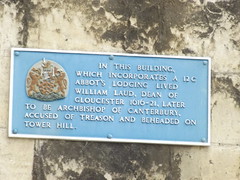The Most Rev. William Laud


The Most Rev. William Laud
(1573-1645)
Dean of Gloucester (1616-1621) and Archbishop of Canterbury (from 1633)
Commemorated on 1 plaque
In this building, which incorporates a 12C Abbot's Lodging lived William Laud, Dean of Gloucester 1616-21, later to be Archbishop of Canterbury, accused of treason and beheaded on Tower Hill.
Church House - College Green, Gloucester, United Kingdom where they lived (1615-1620)

